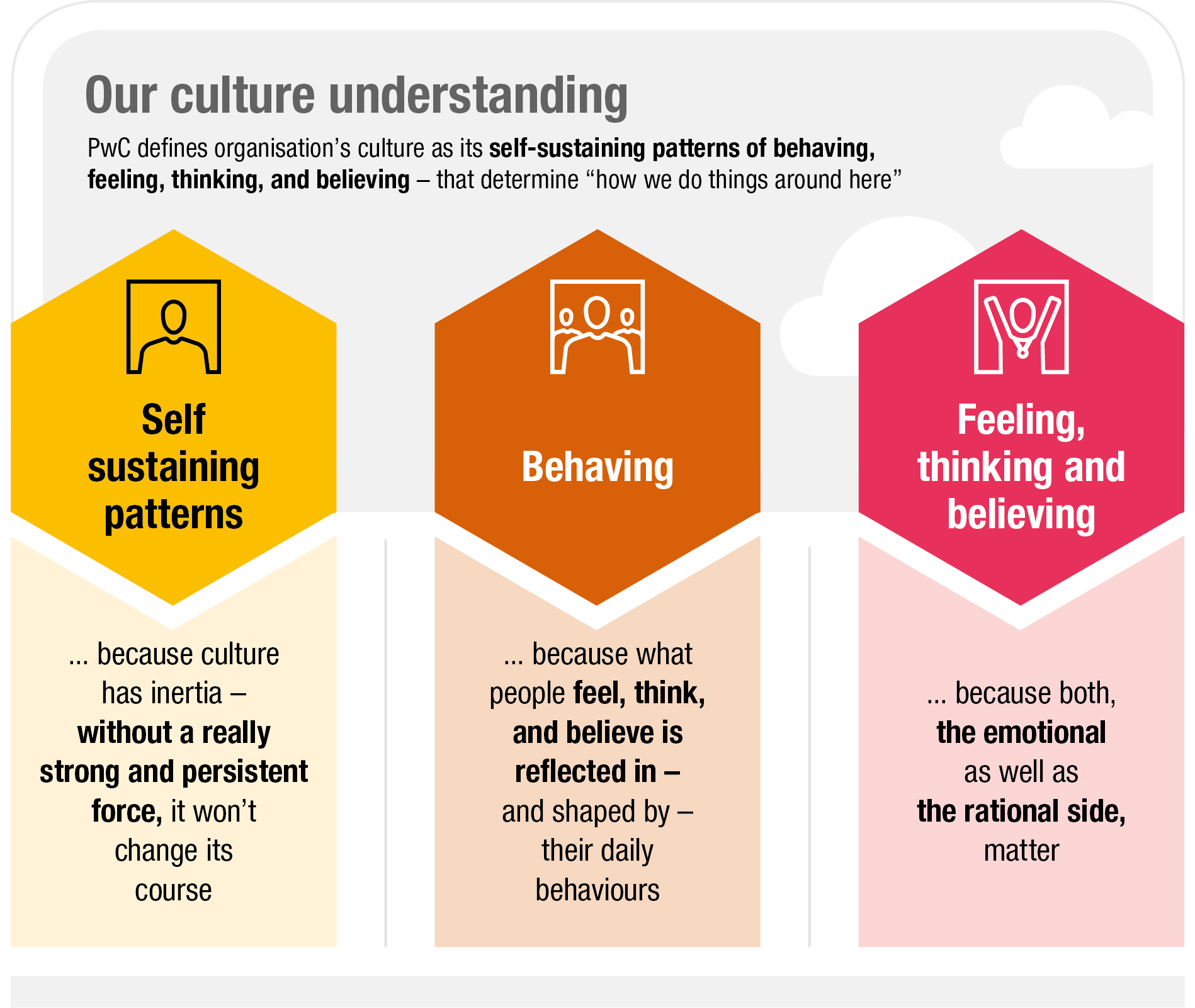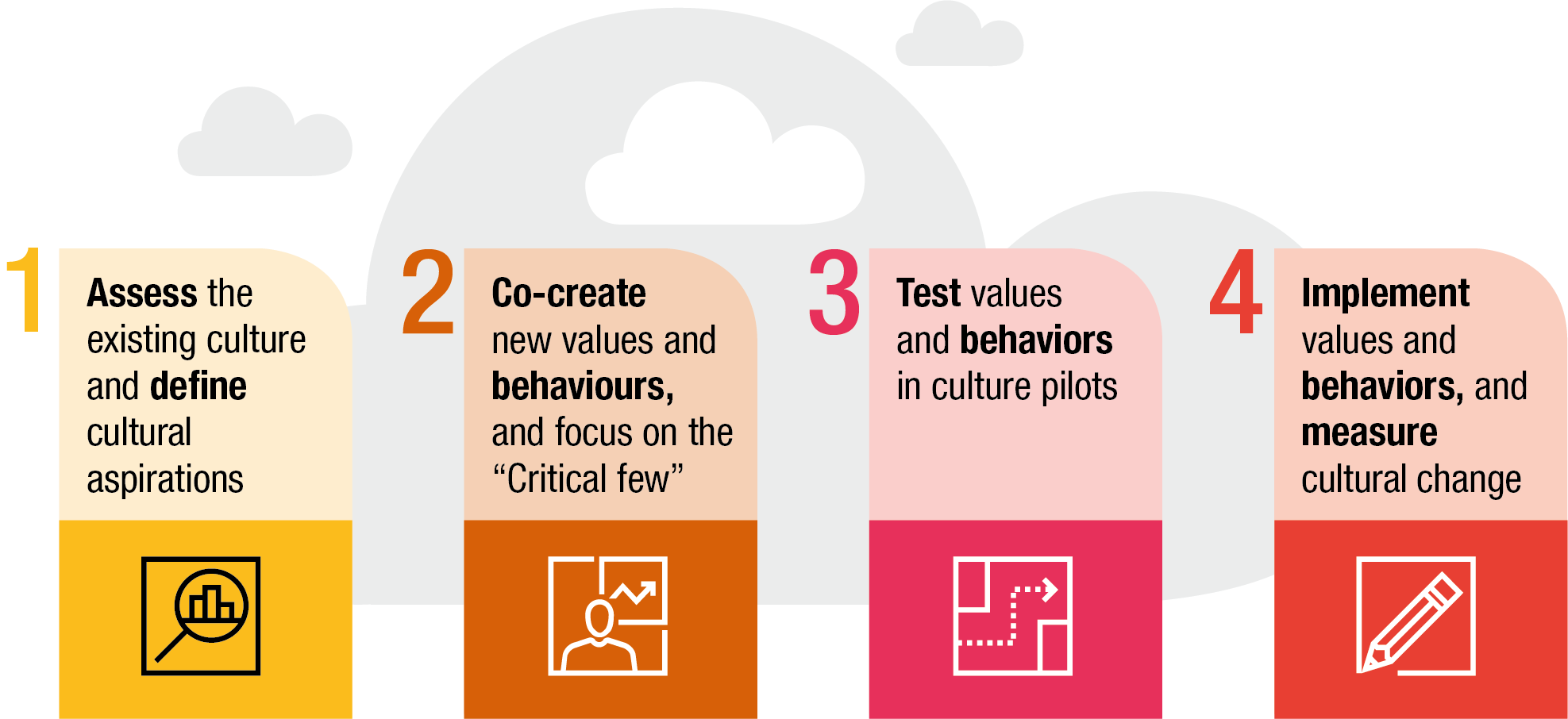If your company purpose is the foundation of successful change and transformation, culture is the glue that holds it together. In this third article in our series, we examine why culture is a key factor in the success of your business.
Year by year, culture is becoming more important on the CEO agenda. In PwC’s Global Culture Survey, 65% of leaders felt that culture was even more important than strategy or operating model when it came to enabling the long-term success of their business. A whole 80% believed that their organisation’s culture would have to evolve in the next five years for their company to sustain in the market.
What do we mean by “culture”?
At PwC, we define culture as “how we do things around here”.

Culture refers to the way we work and therefore has a major impact on the commitment and innovation potential of the workforce. In other words, culture can lead your organisation to success by enabling a high-performance environment and a workforce that is willing to stay.
At PwC we work on cultural change programs in four steps.

Step 1: Assess your existing culture and define cultural aspirations
We start by defining cultural aspirations and the case for change (Why do we need to change? What is our aspiration?). Afterwards, we assess the culture of today by creating an objective data base on current ways of working, including cultural strengths, pain points and gaps that need to be addressed to achieve the cultural aspiration. At PwC, we use a proven methodology called Culture Thumbprint®, a survey-based tool that surfaces insights on organisational culture Usually, we conduct complementary interviews and focus groups to better understand some of the identified cultural traits.
Step 2: Co-create new values and behaviours and focus on the “critical few”
In the second step we co-create values and behaviours that will help us to bring the new culture to life. A value is what we believe in, what we identify with. An example of a value might be “one team”. A behaviour is how we demonstrate our values in our daily work. “Every veto needs a new suggestion” is an example of a behaviour. Since employees can not focus on too many behaviours at once, we focus on 3-5 critical behaviours that have a substantial impact on ways of working and thus organisational performance. This is in line with PwC’s “critical few” methodology.
Step 3: Test values and behaviours in culture pilots
The third step is testing the values and behaviours, a process we call piloting. We recommend starting with a pilot project to test whether the defined values and behaviours are the right ones. To achieve this, we onboard so-called culture champions, motivated employees with a special interest in experimenting with new ways of working, who will apply and test specific behaviours during a two-week culture sprint. At the end of each sprint, the culture champions assess together whether a particular behaviour can be scaled to the whole organisation or whether it needs to be reformulated or discarded. The behaviour “I act as, if it were my own company” is a behaviour that is easy to apply and can therefore be scaled. This process helps narrow down to the critical few behaviours. In every sprint, we use various methods to apply a behaviour. For example, we print behaviour cards and put them next to our work station to inspire us in daily work situations. Or we try to focus on a specific behaviour that we want to apply in a meeting and then ask for feedback from colleagues. The culture champions not only test the behaviours themselves, but also reflect on the process (how to demonstrate behaviours and embed culture change) and give feedback on their experience. Some approaches will work, while others need to be dropped again. But that is exactly what pilots are for: to see what works and where to improve.
Step 4: Implement values and behaviours, and measure culture change
Once the behaviours have been tested and refined in the pilots, they are ready for the roll-out to the whole organisation. At this stage it is very important that people take ownership of the culture initiative to create a company-wide movement. A dedicated culture team with people from different hierarchy levels and functions will be responsible for driving the culture change journey. In the implementation process, it is even more important to find different ways to embed behaviours in the organisation. There can be formal and informal mechanisms for this. Formal measures could be building your new values and behaviours into the recruitment interview to assess personal fit, or including them in the performance evaluation process. An informal measure could be that employees try to inspire their daily interactions with colleagues with some of the agreed values and behaviours.
After successful implementation, it is important to measure how your organisation is developing and the extent to which culture is really supporting your purpose, strategy and operating model. When you are successful, do not forget to celebrate your success. But also make sure to celebrate your failures, because this is part of the process. Celebrating success and failure is a cultural feature at some of the world’s most successful organisations.
Where do you stand?
Before you click away from this article, challenge yourself to answer the following questions:
- Does your culture support your strategy?
- Are there behaviours which support or do not support your business objectives?
- Do employees throughout the organisation work together in a cohesive way?
A lack of authentic, adhesive culture based on values and behaviours that are understood and lived by can be at the root of things if your organisation’s efforts to change are not succeeding.
What's next?
We have already covered the significance of having a purpose and culture as vital aspects of a transformation. The next important aspect to consider is organisational design. The next article will answer the question “How can organisational design help you unlock your superpowers?”.






